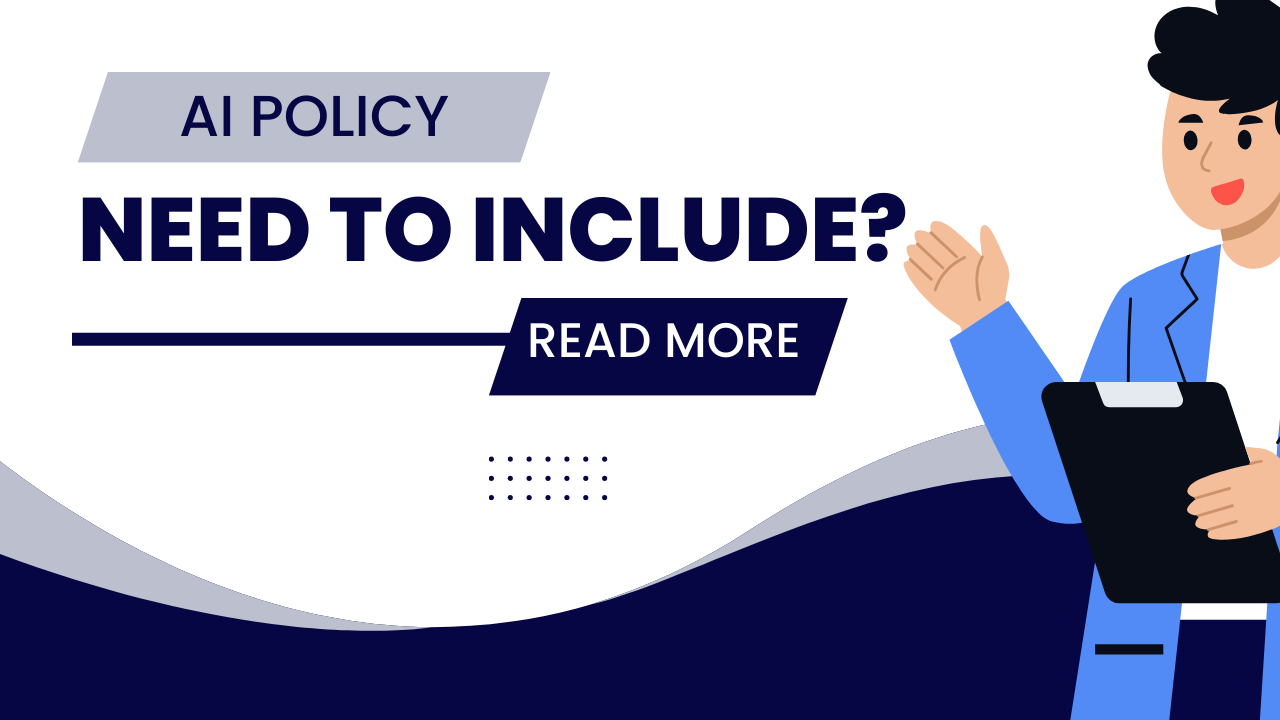-
Connect With Your Ottawa IT Service Company at (613) 828-1384
Connect With Your Ottawa IT Service Company at (613) 828-1384
An effective AI use policy should cover various aspects to ensure responsible, ethical, and compliant use of artificial intelligence within an organization. Here are key components that an AI use policy should typically include:
In the legal services sector, AI has the potential to revolutionize how cases are analyzed and managed. Implementing AI policies can help manage the risks associated with AI usage, such as ensuring the confidentiality and integrity of sensitive client information. Moreover, policies set clear expectations for AI usage and may help mitigate any legal liabilities associated with using AI in the sector.
Healthcare organizations use AI to improve patient care and optimize operational efficiency. Implementing written AI policies can ensure compliance with privacy regulations (such as HIPAA) and promote ethical AI usage, which is critical given the sensitive nature of patient data. Additionally, these policies can guide AI integration in clinical decision-making, providing a framework for responsible and transparent use.
In finance and banking, AI detects fraud, manages risk, and optimizes trading strategies. Ensuring the ethical use of AI is vital in maintaining trust between financial institutions and their customers. Written AI policies help establish industry best practices, reducing the risk of unauthorized access to sensitive data and addressing potential biases in AI-generated decisions.
The IT sector relies on AI for various tasks, from cybersecurity to software development. Implementing AI policies fosters a culture of responsible technology use within the organization and helps address potential risks related to privacy, security, and governance. By setting clear expectations for AI usage, IT companies can better protect their intellectual property and maintain a competitive advantage.
Retail and e-commerce use AI extensively for improving customer experience, marketing, and supply chain management. AI policies should be in place to ensure proper data collection and protection. Moreover, these guidelines can outline best practices for using AI in customer-facing applications, helping to maintain a positive brand reputation.
AI plays a crucial role in automating tasks and increasing efficiency within manufacturing. Developing AI policies can guide the responsible deployment of AI on the production floor, addressing potential safety concerns, impact on employment, and ethical considerations. Clear guidelines can also contribute to successfully integrating AI within the industry and achieving long-term competitive advantages.
AI’s role in transportation and logistics (e.g., self-driving vehicles or route optimization) calls for implementing policies to ensure safety, efficiency, and regulatory compliance. Written AI policies help organizations navigate potential challenges in adopting AI, including the ethical considerations related to job displacement and environmental impact.
Educational institutions increasingly rely on AI for personalized learning, assessment, and administrative tasks. AI policies can guide educators in utilizing AI ethically while maintaining students’ privacy and promoting accessibility and inclusiveness. Schools and colleges can safely and effectively incorporate AI technologies into their educational systems by implementing AI policies.
Government agencies use AI for decision-making, public safety, and resource allocation. Implementing AI policies can promote transparency, address potential biases, and improve the public’s trust in AI-driven decisions made by government bodies. Furthermore, AI policies can ensure compliance with any applicable laws and regulations.
In the insurance industry, AI automates claim processing and risk assessment. AI policies can help protect customers’ sensitive information and ensure unbiased decision-making. Implementing guidelines for AI usage encourages ethical handling of customer data and maintains a high level of trust within the industry.
Telecom companies use AI for optimizing network performance, customer support, and fraud detection. By adopting AI policies, these companies can ensure that AI usage respects privacy concerns and complies with regulatory requirements. Establishing AI guidelines can also help telecommunications providers address potential security threats and maintain a high level of service.
HR departments increasingly use AI for talent acquisition, performance management, and employee engagement. Implementing AI policies can ensure responsible, ethical, and unbiased practices when adopting AI in HR processes. Clear guidelines help HR professionals leverage AI effectively while prioritizing employee well-being and privacy.

As we integrate AI technologies further into our organizations, writing AI policies in place becomes increasingly necessary. These policies guide AI’s ethical and responsible deployment, ensuring a balance between its benefits and associated risks. Organizations relying heavily on AI in operations management, information systems, and business practices should prioritize creating such policies.
We must develop these policies while considering the guidelines provided by standard-setting institutions, such as the National Institute of Standards and Technology (NIST). By doing so, we can better incorporate trustworthiness into our AI systems’ designs and implementations.
AI policies should also address potential legal and regulatory challenges arising from adopting and using AI technologies. By staying informed about the rapidly evolving world of AI, we can minimize these risks and ensure our organization’s compliance with applicable regulations.